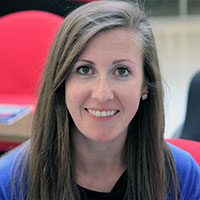Master's in Urban & Regional Planning
Maura Brophy

Maura Brophy was already working in affordable housing when she enrolled in the Master’s in Urban & Regional Planning program at Georgetown. As an Asset Manager for the Community Preservation and Development Corporation (CPDC), she served on six redevelopment project teams and oversaw the delivery of more than $16 million in Low-Income Housing Tax Credits.
Brophy loved her work. Yet as much as she valued creating housing opportunities in low-income neighborhoods, she knew she wanted to explore other areas of urban planning—especially new ways of financing urban infrastructure and large-scale urban development—and develop a more comprehensive understanding of the profession. Today, Maura serves as President and CEO of the NoMa Business Improvement District, one of the most innovative neighborhood development initiatives in the United States.
Georgetown’s program helped her make that transition. Even as a student in the program, she started work at the Federal City Council, a 70-year-old nonprofit that represents the business community in Washington, D.C. There, she advocated for some of the biggest projects in D.C., including the expansion of the Metro, the redesign of Pennsylvania Avenue, and the redevelopment of historic Union Station.
At Georgetown, Brophy became part of a community of students, instructors, and urban planning professionals who were as committed to the field as she was. In her second year of the program, she teamed up with fellow student Arianna Koudounas to complete a comparative analysis of ecodistricts in Seattle, Portland, and D.C.
Ecodistricts are designated city sectors that focus on reducing the municipality’s environmental footprint and improving its quality of life. As a result of their work, the two were later invited to present their findings at the American Planning Association’s annual conference in Seattle.
“The Georgetown Urban & Regional Planning program does a wonderful job of making resources and classwork available to explore areas of individual interest,” Brophy said. “It allows people who are entering or advancing in the field of urban planning and development to connect with people who have deep experience; and I think that’s one of the greatest advantages I benefited from.”